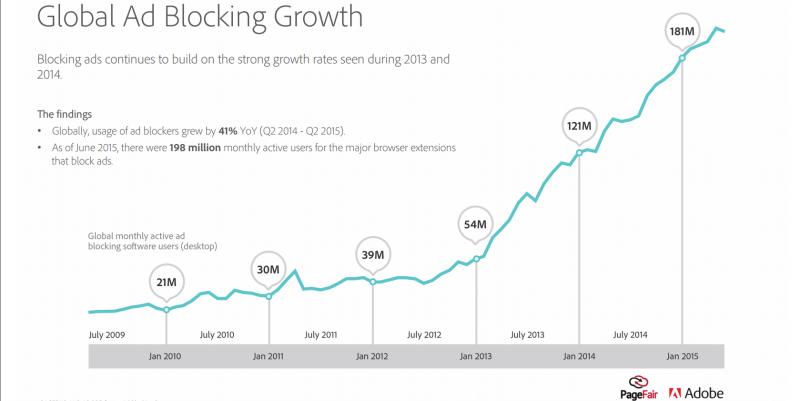-
Tips for becoming a good boxer - November 6, 2020
-
7 expert tips for making your hens night a memorable one - November 6, 2020
-
5 reasons to host your Christmas party on a cruise boat - November 6, 2020
-
What to do when you’re charged with a crime - November 6, 2020
-
Should you get one or multiple dogs? Here’s all you need to know - November 3, 2020
-
A Guide: How to Build Your Very Own Magic Mirror - February 14, 2019
-
Our Top Inspirational Baseball Stars - November 24, 2018
-
Five Tech Tools That Will Help You Turn Your Blog into a Business - November 24, 2018
-
How to Indulge on Vacation without Expanding Your Waist - November 9, 2018
-
5 Strategies for Businesses to Appeal to Today’s Increasingly Mobile-Crazed Customers - November 9, 2018
Can online publishers embrace ad blocking?
In the UK, ad blocking has grown by 82pc in the last year, reaching 12m monthly active users in the second quarter.
Advertisement
‘The cost of ad blocking’ study from PageFair and Adobe said that nearly 200 million monthly internet users are now deploying browser extensions that block ads.
PageFair co-founder and chief executive Sean Blanchfield said ad block users are inadvertently inflicting multi-billion dollar losses on the very websites they most enjoy.
Mobile phones are just starting to get into the fun, too: A variety of custom Web browsers for iOS and Android phones have ad-blocking built in or allow users to install software that adds the capability. The global cost of ad blocking is expected to reach $41.4bn by 2016. In addition to compiling data from companies about software installations, researchers questioned 400 people who don’t use ad blockers about the technology.
The U.S.-specific use of adblock grew even faster, rising 48-percent to 45 million active users over the past year ending in June.
It comes as no surprise that the habit of blocking ads has become increasingly popular in the past few years. The report said that while consumers have warmed to the idea of blocking online ads, they may not realize that the practice could hurt websites which rely on ad revenue.
With the use the ad blocking software on the rise, it is set to cost publishers in excess of $40bn by the end of next year according to a report from Adobe and anti-ad blocking firm PageFair, with European audiences more likely to block commercial content, compared to their US counterparts. Greece has the highest rate of ad block usage in Europe, with 36.7% of internet users in the country utilizing the software.
PageFair has tracked the growth of ad blocking for three years, and measures over a billion ad blocking hits every month across its 3,000+ client websites to determine the types of content most affected. There are several solutions that publishers can use to combat the growing ad-block problem, including education, technical solutions, and micropayments. Of those who are now not using ad blocking extensions, the misuse of personal information by advertisers and publishers was the primary reason that would convince them to change their mind.
Advertisement
Ironically, it is Google’s Chrome browser that is leading the charge in blocking ads – where Google’s primary source of revenue is online advertising.




























